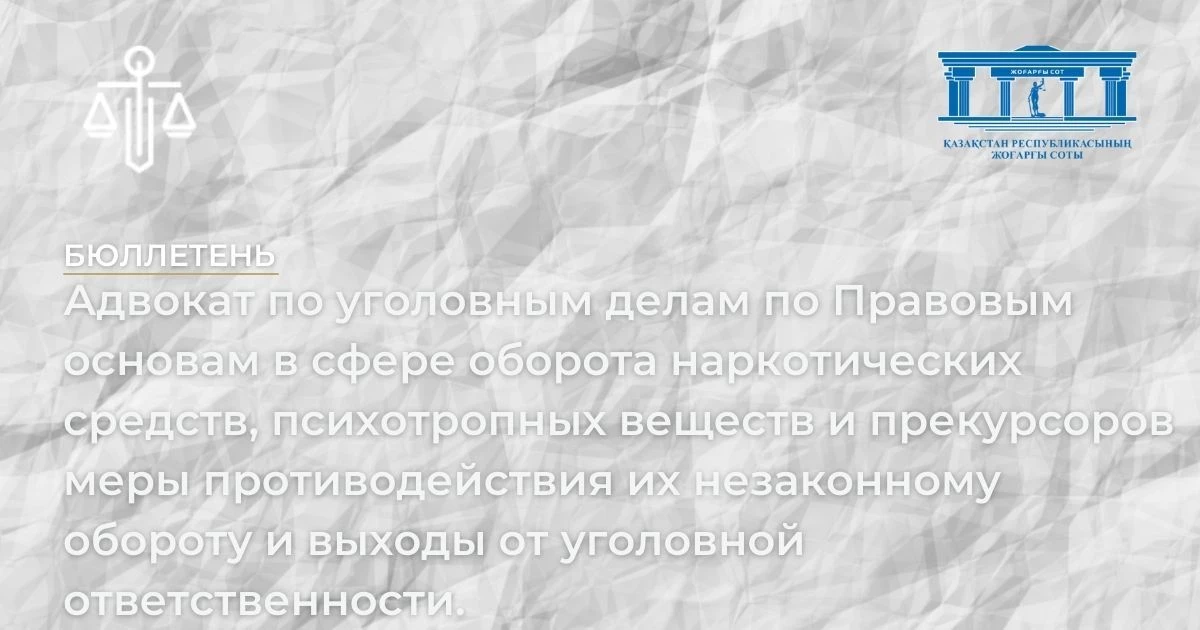A criminal lawyer on the Legal basis in the sphere of trafficking in narcotic drugs, psychotropic substances and precursors, measures to counteract their illicit trafficking and escape from criminal liability.
The legal bases of the Republic's State policy in the sphere of trafficking in narcotic drugs, psychotropic substances and precursors, and measures to counter their illicit trafficking are established and regulated by the Law of July 10, 1998 "On Narcotic Drugs, Psychotropic Substances, Precursors and measures to counter their illicit trafficking and abuse." Criminal liability for crimes related to illicit trafficking in narcotic drugs and psychotropic substances is provided for in chapter 10 "Crimes against public health and morals" of the Criminal Code. It should be noted that in accordance with the Law of January 18, 2011 "On Amendments and additions to certain legislative acts of the Republic of Kazakhstan on further humanization of criminal legislation and strengthening guarantees of legality in criminal proceedings", part 1 of Article 259 of the Criminal Code was deleted, these acts were transferred to the category of administrative offenses. When bringing a person to criminal responsibility, the List of Narcotic Drugs, Psychotropic Substances and Precursors subject to Control in the Republic of Kazakhstan (as amended on June 03, 2011) and a Summary Table on the classification of narcotic drugs, psychotropic substances and precursors to small, large and especially large sizes found in illicit trafficking are applied, attached to the Law "On narcotic drugs, psychotropic substances, precursors and measures to counteract their illicit trafficking and abuse."
Along with the above-mentioned normative acts, the courts, when considering cases of this category, are also guided by the normative resolution of the Supreme Court "On the Application of Legislation in Cases Related to Illicit Trafficking in Narcotic Drugs, Psychotropic Substances and Toxic Substances" No. 3 dated May 14, 1998 (hereinafter referred to as the normative resolution of the Supreme Court dated May 14, 1998), which amended amendments and additions on July 11, 2003 and April 21, 2011. A study of the judicial practice of considering cases related to illicit trafficking in narcotic drugs and psychotropic substances has shown that in most cases the courts correctly apply the criminal law, are guided by the current legislation, and the explanations contained in the regulatory resolution of the Supreme Court of the Republic of Kazakhstan No. 3 dated May 14, 1998. However, problematic issues in law enforcement practice continue to occur. In accordance with the provisions of the Law "On Operational Search Activities", the operational purchase of narcotic drugs or psychotropic substances and other operational search activities are carried out only if there are grounds provided for by law for their conduct, with the knowledge and under the supervision of the body carrying out operational search activities in accordance with the tasks assigned to it and within its competence.. When carrying out operational search activities, it is prohibited to incite and provoke citizens to commit offenses (paragraph 9-4 of the regulatory decree of the Supreme Court of May 14, 1998). However, the criminal prosecution authorities do not always comply with the above-mentioned requirements of the law.
In practice, when detaining and seizing narcotic drugs by the criminal prosecution authorities, a "protocol of examination of a living person" is often drawn up, whereas, in fact, a personal search of a person is carried out, the procedure for which is regulated in chapter 29 of the CPC. For example, the preliminary investigation body has drawn up an inspection report upon the seizure of the narcotic heroin in the amount of 2.16 grams from citizen F. While his personal search was actually carried out, as the detainee's clothes were examined, a bag of heroin was seized from the pocket of his jeans trousers. In addition, in violation of article 232 of the CPC, the prosecutor was not informed about the personal search conducted without authorization, and there is no prosecutor's decision on the legality of its conduct in the case. Therefore, the court recognized the inspection report as inadmissible evidence, which led to the exclusion from the charge of the fact of illegal acquisition, possession of narcotic drugs of 2.16 grams for the purpose of sale. By the verdict of the specialized interdistrict Criminal Court of the Akmola region dated May 30, 2012, F. He was found guilty under paragraphs "b, c" of Part 3 of Article 259 of the Criminal Code and sentenced to 10 years in prison.
Attention!
Law and Law Law Law draws your attention to the fact that this document is basic and does not always meet the requirements of a particular situation. Our lawyers are ready to assist you in legal advice, drawing up any legal document suitable for your situation.
For more information, please contact a Lawyer / Attorney by phone: +7 (708) 971-78-58; +7 (700) 978 5755, +7 (700) 978 5085.
Attorney at Law Almaty Lawyer Legal Services Legal Advice Civil Criminal Administrative Cases Disputes Protection Arbitration Law Firm Kazakhstan Law Office Court Cases
Download document
-
Адвокат по уголовным делам по Правовым основам в сфере оборота наркотических средств, психотропных веществ и прекурсоров меры противодействия их незаконному обороту и выходы от уголовной ответственности.
168 downloads -
Адвокат по уголовным делам по Правовым основам в сфере оборота наркотических средств психотропных веществ и прекурсоров меры противодействия их незаконному обороту и выходы от уголовной ответственности.
185 downloads -
Адвокат по уголовным делам по Правовым основам в сфере оборота наркотических средств, психотропных веществ и прекурсоров меры противодействия их незаконному обороту и выходы от уголовной ответственности.
176 downloads


